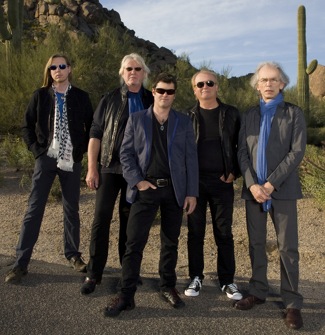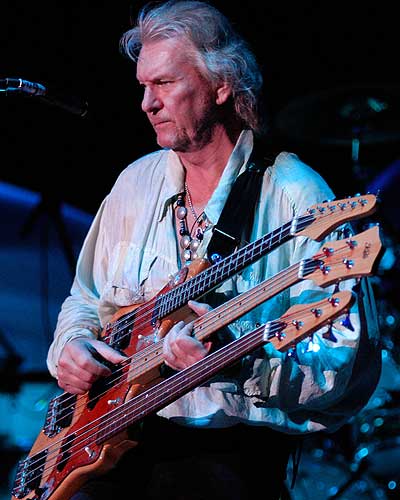More than 40 years ago, prog rock pioneers Yes embarked on a sonic journey that saw them shape a genre, rise to the heights of rock superstardom, and stage a saga, which, as they put the finishing touches on their 20th studio album—rumored to be titled Fly from Here—continues to write itself. Noted for their musical prowess, expansive compositions and limitless exploration, a fragile, emotional core lies at the heart of Yes’ sound—one as ambitious, adventurous, and idyllic as their elaborate multi-part epics. It’s a sound that resonates across the explosive onslaughts of the Mars Volta, the operatic surges of Muse, and the textural voyages of the Flaming Lips. It’s a sound that, through the years, has become known simply as Yesmusic.
Today, Yes staples such as “Roundabout,” “I’ve Seen All Good People,” and “Owner of a Lonely Heart,” remain favorites on classic rock radio stations, and albums such as Fragile, Close to the Edge, and Tales from Topographic Oceans remain fixtures in every vinyl geek’s record collection. Far removed from the forefront of rock, Yes has survived countless lineup changes, and Yesmusic has survived its share of his and lows. Still, Yes evolves much like the lyrics of their 1971 track “Perpetual Change” suggests: “Inside out, outside in, every way.”
The band’s current lineup boast longtime members guitarist Steve Howe and drummer Alan White, newcomers vocalist Benoit David and keyboardist Oliver Wakeman (son of heralded keyboardist and Yes alum Rick Wakeman), and original bassist Chris Squire—the only member of Yes to have been a part of each of its various incarnations. I caught up with the legendary bassist, as the group prepares to kick off an intimately staged, one-month mini-tour, fittingly titled The Rite of Spring. The tour stops at House of Blues Ash Wednesday, March 9. Tickets can be purchased here.
Tell me about the current Yes lineup.
Well, the current lineup of the band has been out there doing shows for a couple of years—since the In the Present tour (2009). That’s the lineup with Benoit David singing and Oliver Wakeman playing keyboards.
Was it difficult to move forward without Jon Anderson singing?
Not really, no. People move on, times change, things get updated. That’s what happens. We adjusted to not working with him. As with most things over time, things start falling into place, and it’s been going exceptionally well with Benoit.
I hear there’s an interesting story about how you came across Benoit…
When I was over in London three or four years ago, a friend of mine showed me a video on YouTube of what I thought was a Yes show from somewhere. I was kind of distracted—doing something else. Then, when I really started to pay attention to it, I realized that it was actually this tribute band Close to the Edge that Benoit was the lead singer for. I was impressed with his ability to sing in a way similar to Jon Anderson, and I made a note that if we’d ever need anyone to stand in for Jon, he had to be our guy.
Tell me about the new Yes album. What’s been the driving force behind it?
In actual fact, Yes hasn’t made a studio album in quite some time. We’ve had live recordings during the last 10 years, but we haven’t been to the studio in nearly 10 years. I’ve been looking forward to the time when we would do that, and we’re about 80 percent of the way through the new album, which you won’t be hearing any of on this tour (laughs). It won’t be released ’til July. We’ll be doing a tour in the summer to present the new album.
Let’s talk about the upcoming mini-tour, playing smaller, more intimate venues over the next few weeks. Yes has built quite a legacy for delivering some of the largest spectacles in rock history. What can we expect on this go-round?
Sometimes it’s just really nice to go and play in a smaller place. It’s really a lot of fun to be that close to the audience. I’ve always enjoyed performing for people over the years in huge places as well as the intimate ones. But we were offered this House of Blues tour—nearly every show on this tour is at a House of Blues—and because we wanted to keep our playing up to standards during the course of making the album, we’ve broken off and done a couple of tours. We did a tour of South America in November when we were in the middle of the album.
With such a large catalog and the current lineup gelling musically, as performers what do Benoit and Oliver bring to the setting?
Our main objective is to reproduce faithfully the music as was played on the original studio recordings. We’ve always prided ourselves on being able to pull off some of the trickiest moments. Live, it gives us a chance to stretch out. Now Benoit is comfortable singing with us, and Oliver is a great keyboard player. He certainly has made all of the keyboard sounds come alive. He really pays a lot of attention to detail.
It’s a great feeling to play with other great musicians like Steve Howe (guitar) and Alan White (drums), whom I’ve been playing with for years. When you put us all together, it becomes an interaction. It’s very enjoyable when we do a live show—when we bring all of these elements out.
Over the past 40 years, members have come and gone, sounds have changed, and time has passed. Still, you’re the only member of Yes to have been a part of the band from its inception. What motivates you to make new music? What’s kept Yes going?
The great thing I’ve found is that when new members have come into the band, it has acted like an injection of adrenaline to the musical force. When changes happen, the incoming members have brought with them new sets of ideas and capabilities. I’ve been very fortunate in that I’ve managed to learn a lot from all the different members who have been around.
Being a part of the Yes sound from the beginning until today, do you think it’s something that will eventually come full circle, or do you feel it will continue to be marked by changes. The Yes saga is definitely at an interesting point right now, moving forward in its fourth decade, taking on new members, and releasing new material.
Yes, we are. On this new album we’ve also been working with Geoff Downes on keyboards, who was in Yes in 1980 as well. So there’s going to be some of his influence on the album. Trevor Horn is producing the album. In a way the new Yes album is going to be an interesting combination of Drama revisited. Having completed the tracks, I’m extremely happy with it, and I think most people will be surprised with the direction we’re going in because it does embody some values of the ’70s—there’s one piece that is over 20 minutes long and others that are of very substantial length. It’s all sounding very good to me as it’s come together, but that’s all I’m going to say.
Looking back, Yes was a part of a group of bands whose sound played a formative role in the creation of a genre that rock critics would go on to call “progressive rock.” Is “prog” a label you’re comfortable with?
Ha! Well, comfortable with it or not, that’s the one they use (chuckles). But I’m fine with it.
Aside from critical and commercial success, Yes, along with progressive groups such as King Crimson and Rush, has had a significant impact on the legacy of rock music. Yet, it seems you get overlooked when it comes to things like the Rock and Roll Hall of Fame. Do you feel that Yes deserves to be inducted into the Rock and Roll Hall of Fame?
I don’t really know how they determine the candidates for the Rock and Roll Hall of Fame. I know Jann Wenner, the guy who runs Rolling Stone, is a big influence on the way things go, and Rolling Stone has never been a fan of progressive music. Having said that—whether or not Yes deserves to get in at some point—we were, after all, one of the best-selling progressive acts and biggest stadium rock acts of all time. Maybe at some point, somebody will notice that (laughs). They did put Genesis in there, though. So maybe that’s a token move towards progressive music. We’ll see what happens.
Do you ever go back today and listen to the older Yes albums?
I do. Whenever we talk about coming up with a set for a tour, we go and have a listen to sections from things in the past. On the last tour, we did “Astral Traveler” from Time and a Word, which we hadn’t done for years and years and years and years. We do like to go back and dig some things out of the vault for live shows, and we’ll be doing that on this particular tour as well.






